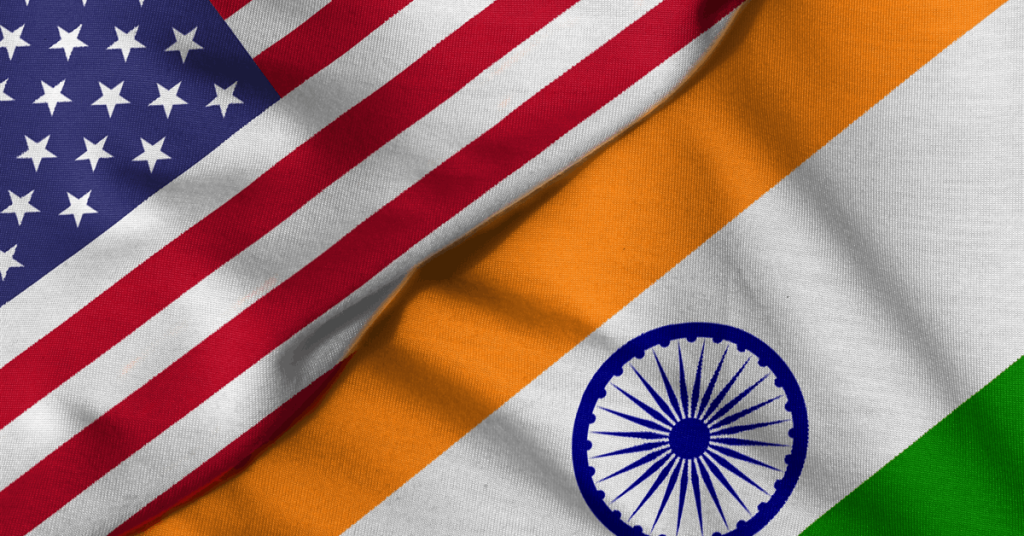President Donald Trump said Prime Minister Narendra Modi assured him during a phone call Tuesday that India would wind down purchases of Russian oil, a possible reprieve to their trade impasse.
Trump said at the White House during a Diwali celebration that the two leaders had “talked about a lot of things, but mostly the world of trade — he’s very interested in that.” Modi acknowledged the call in a social media post on Wednesday, without mentioning the content of the discussion.
Trump hit India with 50% tariffs on its exports to the US in part to pressure New Delhi to stop buying Russian oil and to counter what the US has cast as high levies and other barriers on American goods.
The US president said last week that he had received assurances from Modi that India would stop buying oil from Russia, transactions seen by Ukraine’s allies as buoying the Kremlin’s economy and war effort. New Delhi hasn’t confirmed whether it would comply and the Ministry of External Affairs said it wasn’t aware of a call between Trump and Modi last week.
On Tuesday, Trump appeared to signal that India would curb rather than halt purchases of Russian energy.
“He’s not going to buy much oil from Russia,” Trump said. “He wants to see that war end as much as I do. He wants to see the war end with Russia, Ukraine, and as you know, they’re not going to be buying too much oil.”
In a post on X, Modi thanked Trump for the “warm Diwali greetings.” The Indian embassy didn’t immediately respond to a request for comment on the call. The White House also did not immediately respond to a request for more details.
Thank you, President Trump, for your phone call and warm Diwali greetings. On this festival of lights, may our two great democracies continue to illuminate the world with hope and stand united against terrorism in all its forms.@realDonaldTrump @POTUS
— Narendra Modi (@narendramodi) October 22, 2025
Trump has softened his rhetoric on India in recent weeks as the two nations carry out talks to clinch a trade deal and lower tariffs. Any effort to scale back Russian energy buys would be a gradual process, and Modi’s government has previously indicated that the country would continue to make those purchases if it is economically viable.
The two sides are narrowing their differences over trade and are working toward an agreement that could see the tariff rate on Indian goods lowered to 15-16%, Mint newspaper reported Wednesday, citing unidentified people familiar with the matter. Trade negotiators from New Delhi made solid progress in their talks in the US last week, an official said on the weekend.
India became a major importer of Russian crude after the start of the war in Ukraine in 2022, buying oil at a discount. Russian oil makes up about a third of India’s overall imports despite the US push to curb flows.
Trump and Modi have been at odds over the US president’s claims that he used trade as leverage to broker a ceasefire between India and Pakistan in May. While Pakistan has embraced that assertion — and nominated Trump for a Nobel Peace Prize — Modi and Indian officials have bristled at the notion that the US pressured them into a ceasefire.
Generated by readers, the comments included herein do not reflect the views and opinions of Rigzone. All comments are subject to editorial review. Off-topic, inappropriate or insulting comments will be removed.
element
var scriptTag = document.createElement(‘script’);
scriptTag.src = url;
scriptTag.async = true;
scriptTag.onload = implementationCode;
scriptTag.onreadystatechange = implementationCode;
location.appendChild(scriptTag);
};
var div = document.getElementById(‘rigzonelogo’);
div.innerHTML += ” +
‘‘ +
”;
var initJobSearch = function () {
//console.log(“call back”);
}
var addMetaPixel = function () {
if (-1 > -1 || -1 > -1) {
/*Meta Pixel Code*/
!function(f,b,e,v,n,t,s)
{if(f.fbq)return;n=f.fbq=function(){n.callMethod?
n.callMethod.apply(n,arguments):n.queue.push(arguments)};
if(!f._fbq)f._fbq=n;n.push=n;n.loaded=!0;n.version=’2.0′;
n.queue=[];t=b.createElement(e);t.async=!0;
t.src=v;s=b.getElementsByTagName(e)[0];
s.parentNode.insertBefore(t,s)}(window, document,’script’,
‘https://connect.facebook.net/en_US/fbevents.js’);
fbq(‘init’, ‘1517407191885185’);
fbq(‘track’, ‘PageView’);
/*End Meta Pixel Code*/
} else if (0 > -1 && 91 > -1)
{
/*Meta Pixel Code*/
!function(f,b,e,v,n,t,s)
{if(f.fbq)return;n=f.fbq=function(){n.callMethod?
n.callMethod.apply(n,arguments):n.queue.push(arguments)};
if(!f._fbq)f._fbq=n;n.push=n;n.loaded=!0;n.version=’2.0′;
n.queue=[];t=b.createElement(e);t.async=!0;
t.src=v;s=b.getElementsByTagName(e)[0];
s.parentNode.insertBefore(t,s)}(window, document,’script’,
‘https://connect.facebook.net/en_US/fbevents.js’);
fbq(‘init’, ‘1517407191885185’);
fbq(‘track’, ‘PageView’);
/*End Meta Pixel Code*/
}
}
// function gtmFunctionForLayout()
// {
//loadJS(“https://www.googletagmanager.com/gtag/js?id=G-K6ZDLWV6VX”, initJobSearch, document.body);
//}
// window.onload = (e => {
// setTimeout(
// function () {
// document.addEventListener(“DOMContentLoaded”, function () {
// // Select all anchor elements with class ‘ui-tabs-anchor’
// const anchors = document.querySelectorAll(‘a .ui-tabs-anchor’);
// // Loop through each anchor and remove the role attribute if it is set to “presentation”
// anchors.forEach(anchor => {
// if (anchor.getAttribute(‘role’) === ‘presentation’) {
// anchor.removeAttribute(‘role’);
// }
// });
// });
// }
// , 200);
//});

